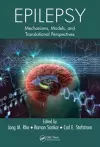
Epilepsy
3 contributors - Hardback
£220.00
Tallie Z. Baram, MD, PhD is a Professor of Pediatrics, Anatomy/Neurobiology, Neurology and Physiology/Biophysics at the University of California-Irvine, and the Danette Shepard Professor of Neurological Sciences. Baram is a child neurologist and developmental neuroscientist and who has been focusing her efforts on programming the developing brain as a result of early-life experiences. Baram’s group has studied this broad topic in two contexts: a. how early-life experiences including stress and maternal care influence resilience and vulnerability to cognitive and emotional d3isorders; b. how early life seizures, especially those associated with fever, can convert a normal brain into an epileptic one. Baram’s discoveries have been translational, providing the foundation of an FDA-approved therapy and of novel clinical imaging approaches. Baram’s research contributions have been recognized by prestigious awards including the NIH NINDS Javits Merit Award, AES Basic Science Research Award, and the CNS Sachs Award, and she has chaired the NIH Developmental Brain Disorders study section. Dr. Shlomo Shinnar is a neurologist, pediatrician and epidemiologist at the Albert Einstein College of Medicine. His expertise focuses on comprehensive epilepsy management, child neurology and epilepsy with a focus on long term studies the prognosis of childhood seizures disorders. He is also an experienced clinical trialist and is the co-director of the Einstein NeuroNEXT cener of Excellence for Clinical Trials in Neurology.Dr. Shinnar conducts research on a variety of topics relating to childhood seizures, including when to initiate and discontinue antiepileptic drug therapy, prognosis following a first seizure, and prognosis following discontinuation of medications in children with seizures. He is also interested in the comorbidities of epilepsy and its impact on children and families. He current studies focus on status epilepticus, a life-threatening condition of persistent continuous and unremitting brain seizure lasting longer than 30 minutes. He is the recipient of the prestigious Research Recognition Award of the American Epilepsy Society and the CURE research award. His continuing research on the Consequences of Prolonged Febrile Seizures in Children (FEBSTAT) study was recently recognized with the prestigious Javits award by the NINDS. Carl E. Stafstrom, M.D., Ph.D., is the Lederer Endowed Chair of Pediatric Epilepsy, and serves as the Director of Pediatric Neurology and Director of the John M. Freeman Pediatric Epilepsy Center. Dr. Stafstrom received his medical degree from the University of Washington School of Medicine in Seattle, with residencies at the University of Washington Medical Center and Tufts New England Medical Center, as well as fellowships at Harvard for neurology research and Boston Children’s Hospital in clinical neurophysiology, electroencephalography, and epilepsy. Dr. Stafstrom previously served as Professor of Neurology and Pediatrics at the University of Wisconsin-Madison School of Medicine and Public Health and Chief of Pediatric Neurology at American Family Children’s Hospital at UW Madison.